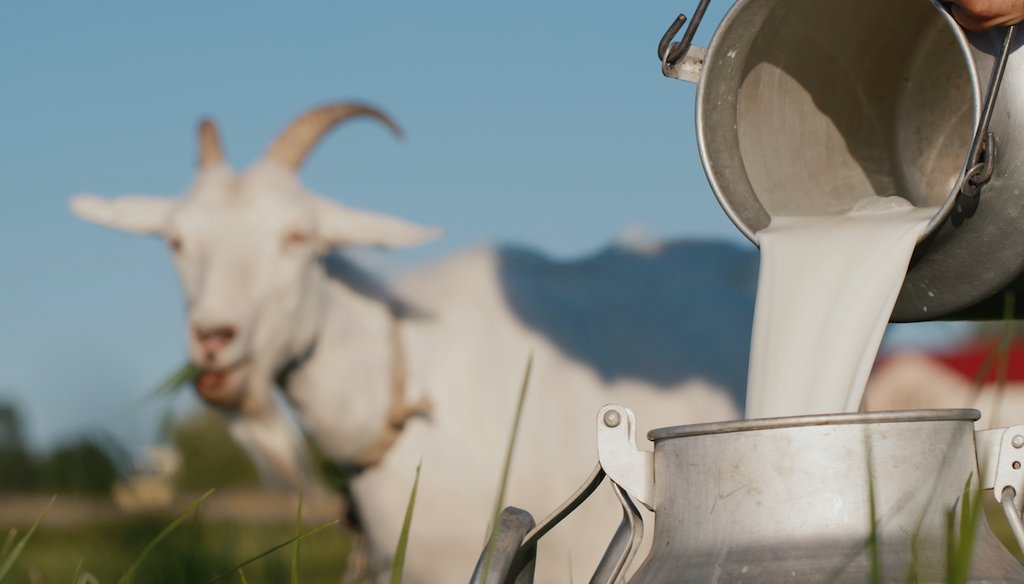

Our only agenda is to publish the truth so you can be an informed participant in democracy.
We need your help.


(Shutterstock)
With the baby formula shortage ongoing, parents are seeking alternatives when they can’t find the products they typically use to feed their children.
Advice abounds online, but it’s not always accurate.
We’ve already debunked claims that people can follow a 1960 recipe for homemade baby formula as a substitute, and that there are loopholes to getting formula from Amazon in Canada or from your state for free.
Some posts are nudging parents to swap their formula for goat’s milk.
"Don’t know who needs to hear this, but goat milk is better than dead GMO baby formula that causes other health issues," one post says.
"Alternative?" another said before it was apparently deleted. "Consider purchasing fresh goat’s milk to bottle feed your baby."
But medical experts warn against it.
This post was flagged as part of Facebook’s efforts to combat false news and misinformation on its News Feed. (Read more about our partnership with Facebook.)
Elizabeth Erickson, a pediatrician with Duke Health, told the News & Observer that goat’s milk can lead to vitamin deficiencies, and that parents should avoid any recipes — not just for baby formula — that calls for unpasteurized dairy products, which can cause bacterial infections.
"There’s a message that ‘we used to do it back in the day,’" Erickson said, "but that doesn’t mean it was a safe choice then either."
Intermountain Healthcare, a Utah-based system of dozens of hospitals, discourages giving babies goat’s milk because "for all its hype, goat’s milk is actually an unsafe choice for infants under 1 year of age." Goat’s milk is "extremely high in protein" compared to human milk or formula, and the body has to make a lot of additional urine to get rid of the extra nutrition, Intermountain Healthcare wrote. It warned this can cause infants to become dehydrated.
The hospital system said there are other risks. Minerals that are excessive in goat’s milk can cause the body to become too acidic, leading to muscle spasms. Meanwhile, goat’s milk also lacks nutrients infants need to create the healthy red blood cells that help stave off fatigue, heart and breathing abnormalities, and more.
Kimberly O’Brien, a professor of human nutrition at Cornell University, said on the school’s website that "in general, I would not advise replacing formula with goat’s milk or cow’s milk. These are not substitutes for human milk or formula."
Jennifer Nicklas, director of the Louisiana Department of Health, told the Lafayette Daily Advertiser that "families should not substitute cow’s milk, goat’s milk, or plant-based milk for infant formula."
A 2010 article in the Journal of Pediatrics described giving fresh goat’s milk to infants as a "dangerous practice" and cited anecdotal reports of "severe electrolyte abnormalities" and "allergic reactions including life-threatening anaphylactic shock," among other problems.
We rate this post False.
Facebook post, May 17, 2022
Facebook post, May 14, 2022
Intermountain Healthcare, Mom Talk: Should I Give My Baby Goat's Milk?, June 15, 2016
Indianapolis Star, How to find baby formula alternatives amid shortage — and why you shouldn't make your own, May 17, 2022
HealthyChildren.org, With the baby formula shortage, what should I do if I can't find any?, visited May 18, 2022
Fox 25, Pediatrician: Goat's milk, Nesquik not good alternatives for baby formula, May 13, 2022
Journal of Pediatrics, Fresh Goat's Milk for Infants: Myths and Realities—A Review, April 1, 2010
Lafayette Daily Advertiser, Can't find baby formula? LDH gives advice on finding substitutes for preferred brands, May 12, 2022
Cornell University, Cornell expert offers tips amidst baby formula shortage, May 10, 2022
The News & Observer, ‘Please ... do not make baby formula at home,’ warns Duke doctor. What to do instead, May 13, 2022
In a world of wild talk and fake news, help us stand up for the facts.
